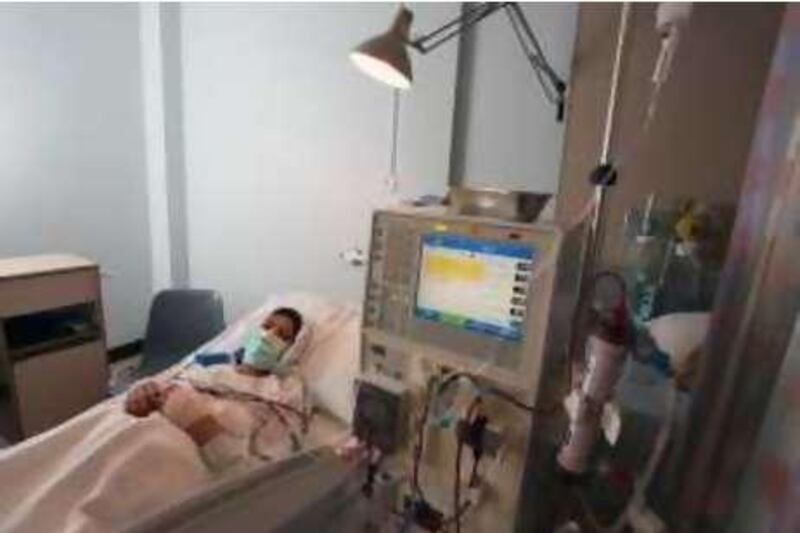SHARJAH // Lifesaving organ transplants from deceased donors may not begin for more than 18 months, despite being given the legal green light in May, according to medical experts. Transplants of organs from the dead were legalised in 1993, but the law lacked the necessary detail for the operations to be performed.
Passed in May, the annexe to the law provided the long-awaited legal definitions. But medical experts have expressed their frustration at the lack of progress, and warn that for many patients, the delays could prove the difference between life and death. Once a death has been confirmed by three specialists, permission for organs to be donated must be given either in the dead person's will, or by his or her family.
For the family of Hussanzari Amroze, 46, who was diagnosed with kidney failure two months ago, the delay means that the hope they were given in May could come to nothing. Mrs Amroze's condition has deteriorated since she was admitted to Qassimi Hospital in Sharjah. Her husband, Syed Amroze, 48, said: "My wife still needs a kidney, but she has been in a coma for a month and a half now. Doctors said that even when she wakes up, she might have become too weak for a transplant."
Dr Akhtarul Iman, a kidney specialist at the hospital, said the law alone did not mean transplants could take place immediately. "There is work to be done," he said. "There needs to be a neutral team in place to harvest organs, and a team to speak to families of the deceased and convince them of the importance of donating organs. "It is sad that so many young people die from car accidents here, but they are all potential donors and that has to be recognised. One dead person's kidneys can save the lives of two people, so imagine what we can do by harvesting the eyes, the liver, the heart and so on."
Dr Mohammed Al Zaabi, a liver transplant specialist at Zayed Military Hospital who also serves on the National Transplant Committee, said that while the law had taken the most important step - defining brain death - other hurdles remain. "We are working on implementing the law, but ... we need some time to make it applicable and realistic," he said. "Even if the law is solid, we need a huge campaign to educate people on brain death and donating organs in order for the foundation to be there."
Until then, encouraging relatives to donate organs wherever possible remains the current solution. "Until cadaveric [deceased donor] transplants become something that is practiced widely in the UAE, living related donor transplantation ... will have to continue," Dr al Zaabi added. For Mrs Amroze, however, it may be too late. She is in a coma, and has a pulmonary edema and fluid in her lungs. She needs dialysis twice a week, and will need a kidney transplant when she awakens.
When her kidney failed six years ago, she bought a replacement organ on the black market in Pakistan. But the couple did not wish to repeat that experience when her kidney failed again in May. Her consultant, Dr Imam, said: "We have to wait and see when she comes out of this coma. "She is in a vegetative state. No one knows what will happen. It is frustrating, we don't have any information yet on what to expect.
"After this law was passed, it was never mentioned again." The decision six weeks ago to implement the new organ transplant law raised her husband's hopes, only to dash them when his wife's condition deteriorated. He has been left "in despair", he said. "When we heard about the law, and that maybe now there will be an organ transplant list that I can add my wife to, we felt so much relief and thankfulness," he said.
"First we had hope, but now we know that just because the law says so, it does not mean we will get a kidney easily. I just hope people begin to understand how important it is to donate their organs. I will donate every organ in my body to help others." The couple's daughter, Zainab, 13, has spent every night of the past six weeks with her unconscious mother. "Zainab is on summer vacation," said Mr Amroze.
"As a man I cannot spend the night in my wife's ward, so my daughter is the one with her, changing her and washing her, because we cannot afford a nurse." For now, the Amroze family can do nothing more than pray. "I am suffering a great deal," Mr Amroze said. "I do not want others to go through that. But maybe our experience will help others." @Email:hkhalaf@thenational.ae





